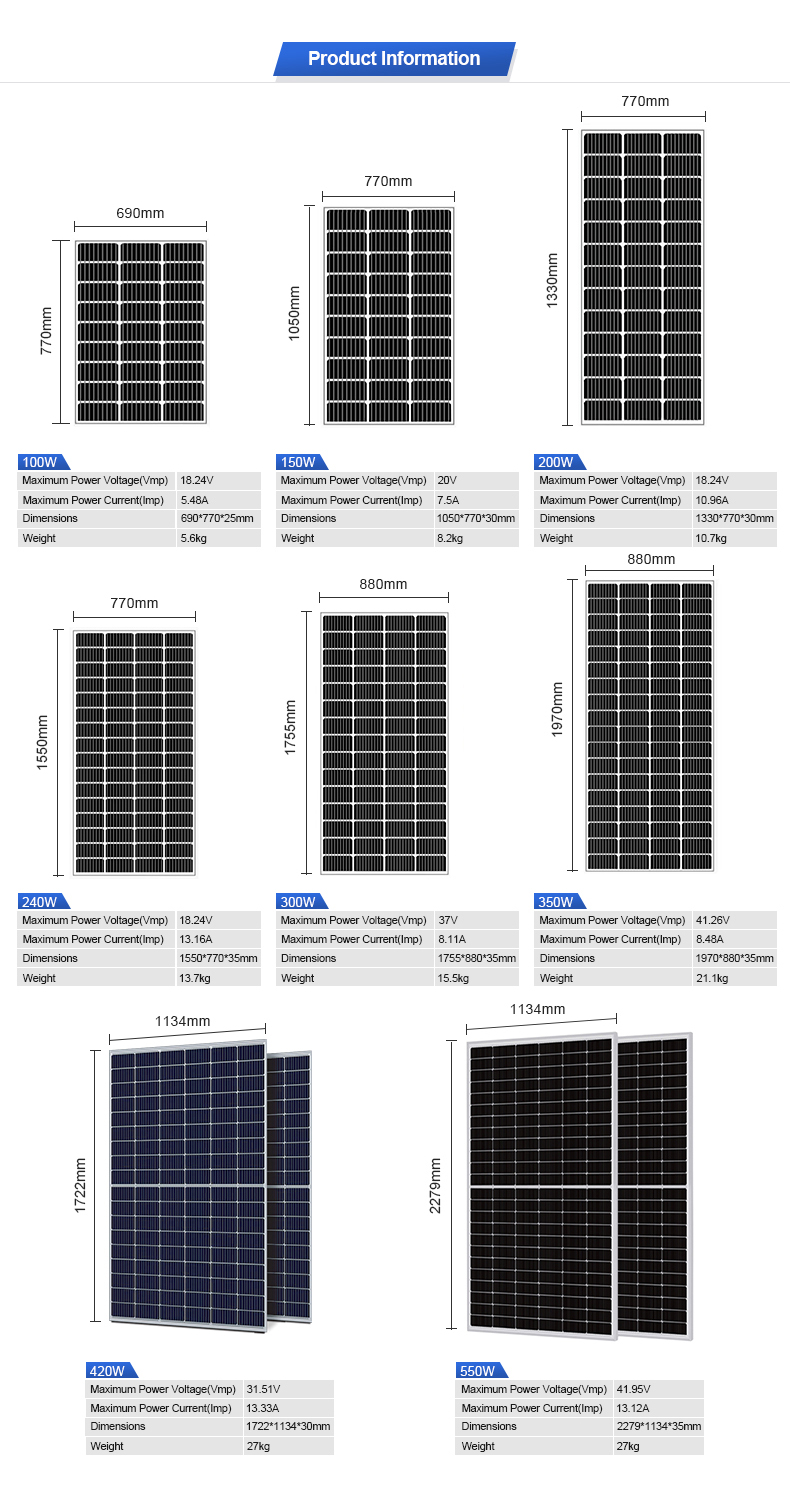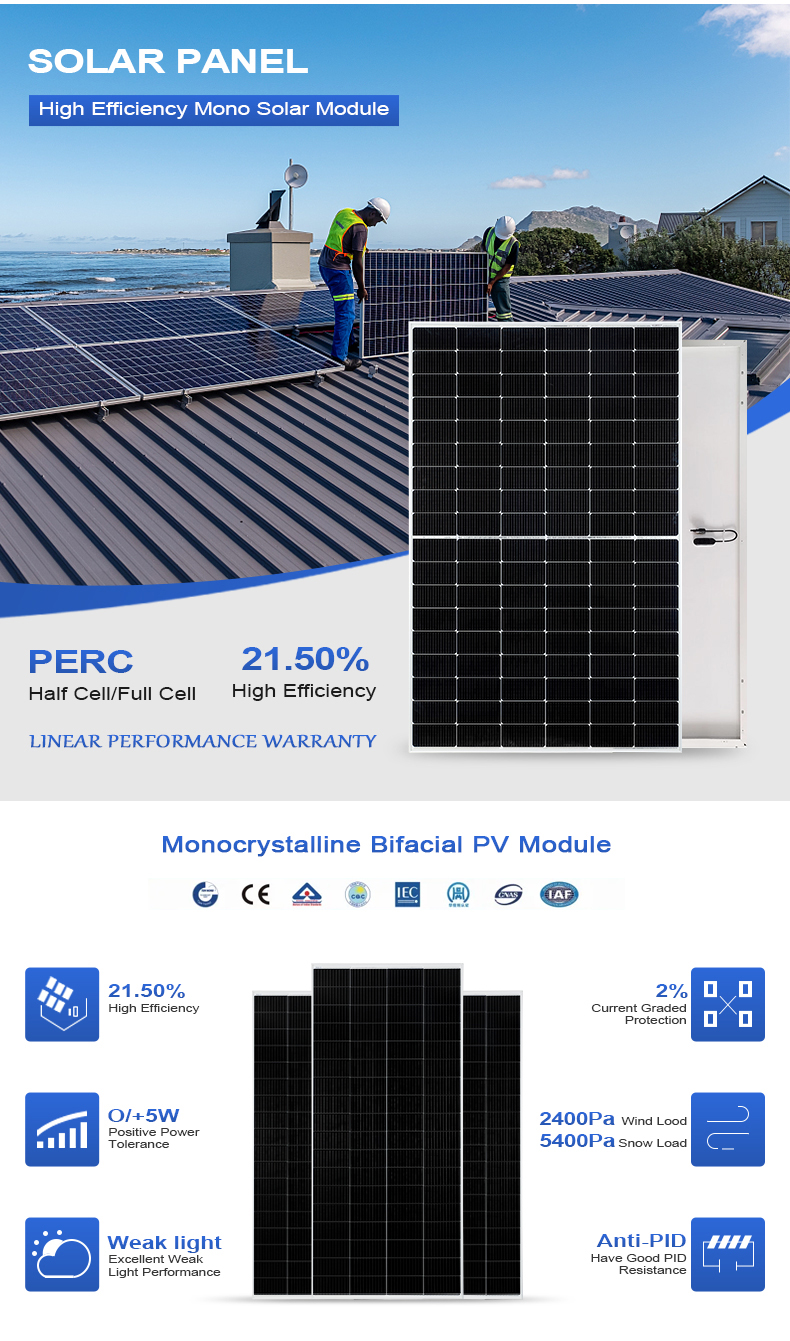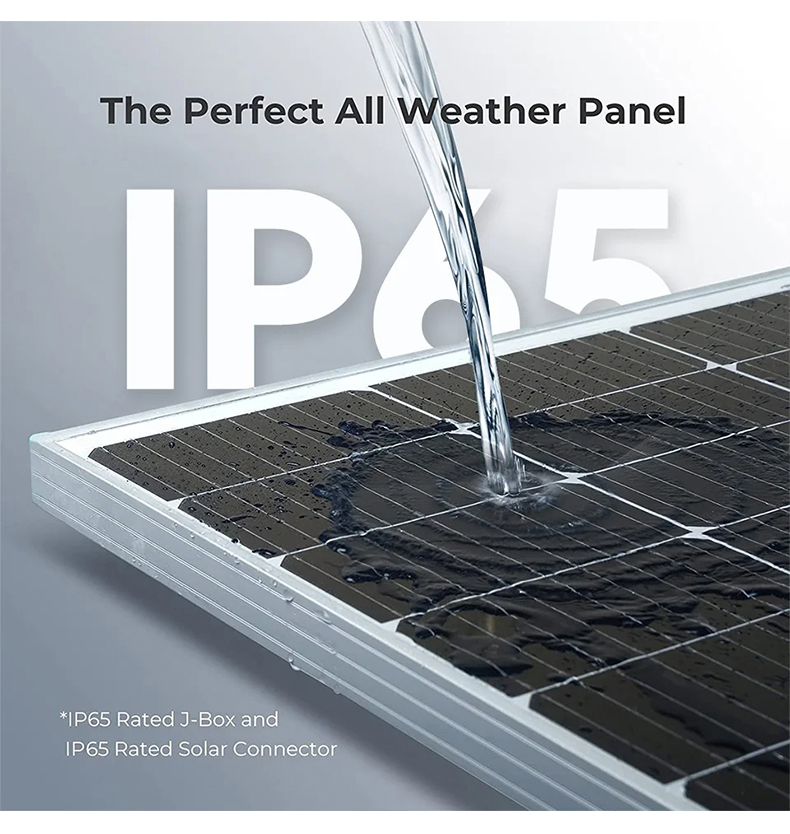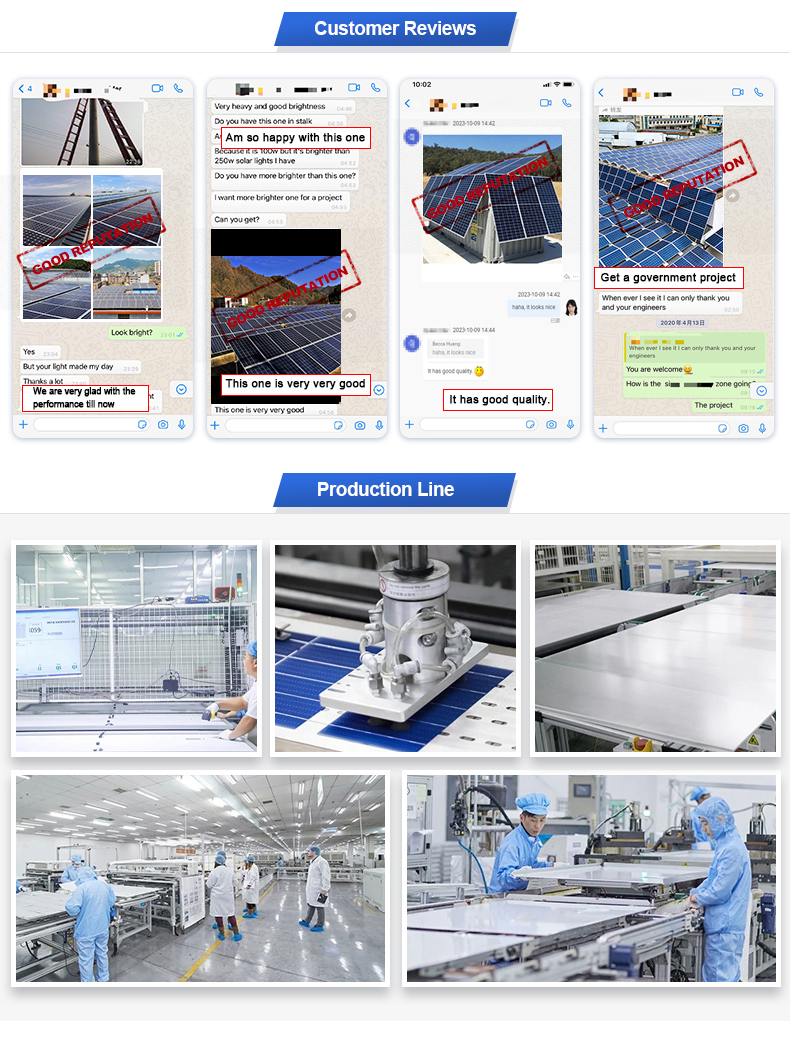| Availability: | |
|---|---|
| Quantity: | |
ST-M
SOLARTHON
100W/150W/200W/240W/300W/350W/420W/550W
21.5%
Mono
Half Cell Solar Panel
Anodized Aluminium Alloy
Industrial
-40ºC~+85ºC
Provide Custom Products
Pallets
ISO, CE, TUV
A solar panel, also known as a solar panel or photovoltaic panel, is a device that converts sunlight into electricity. Here are some basic introductions about solar panels:
How it works:
Solar panels are mainly composed of solar cells (photovoltaic cells), which are usually made of silicon.
When sunlight hits a solar cell, the energy of the photons excites electrons, creating an electric current.
This process, called the photoelectric effect, is the basis for solar panels to produce electricity.
Materials:
The most common solar cell material is silicon, which is divided into monocrystalline silicon, polysilicon and amorphous silicon.
Monocrystalline silicon cells have the highest efficiency, but the cost is also higher; Polycrystalline silicon cells are slightly less efficient, but the cost is lower; Amorphous silicon cells cost the least but are also the least efficient.
Efficiency:
The efficiency of solar panels refers to their ability to convert sunlight into electricity, and this efficiency is usually between 15 and 20 percent, depending on the material and manufacturing technology.
High-efficiency solar panels can produce more electricity under the same lighting conditions.
Applications:
Solar panels are widely used in residential, commercial and industrial sectors to generate electricity.
They are also used in remote or off-grid areas to provide electricity to homes and communities.
In some developing countries, solar panels are being used to provide clean energy and reduce dependence on fossil fuels.
Environmental impact:
Solar energy is a clean energy source that produces no greenhouse gas emissions.

A solar panel, also known as a solar panel or photovoltaic panel, is a device that converts sunlight into electricity. Here are some basic introductions about solar panels:
How it works:
Solar panels are mainly composed of solar cells (photovoltaic cells), which are usually made of silicon.
When sunlight hits a solar cell, the energy of the photons excites electrons, creating an electric current.
This process, called the photoelectric effect, is the basis for solar panels to produce electricity.
Materials:
The most common solar cell material is silicon, which is divided into monocrystalline silicon, polysilicon and amorphous silicon.
Monocrystalline silicon cells have the highest efficiency, but the cost is also higher; Polycrystalline silicon cells are slightly less efficient, but the cost is lower; Amorphous silicon cells cost the least but are also the least efficient.
Efficiency:
The efficiency of solar panels refers to their ability to convert sunlight into electricity, and this efficiency is usually between 15 and 20 percent, depending on the material and manufacturing technology.
High-efficiency solar panels can produce more electricity under the same lighting conditions.
Applications:
Solar panels are widely used in residential, commercial and industrial sectors to generate electricity.
They are also used in remote or off-grid areas to provide electricity to homes and communities.
In some developing countries, solar panels are being used to provide clean energy and reduce dependence on fossil fuels.
Environmental impact:
Solar energy is a clean energy source that produces no greenhouse gas emissions.

Many countries offer tax breaks, subsidies and other incentives to encourage the use of renewable energy.Solar panels are one of the important technologies for achieving energy transition and reducing carbon footprint. With the advancement of technology and the reduction of cost, the application of solar panels is expected to be more widespread.Contact us
Many countries offer tax breaks, subsidies and other incentives to encourage the use of renewable energy.Solar panels are one of the important technologies for achieving energy transition and reducing carbon footprint. With the advancement of technology and the reduction of cost, the application of solar panels is expected to be more widespread.Contact us
For home and commercial electricity. with competitive price, ideal equipment for your home energy storage solutions.Contact us


For home and commercial electricity. with competitive price, ideal equipment for your home energy storage solutions.Contact us


Solarthon Group company, owning three factories, big production capacity, OEM/ODM available. Solarthon is a reputable and famous trademark in China and abroad. Business scope covering diversified models of solar panels, hybrid inverters, lithium battery, solar power systems, etc.Contact us

Solarthon Group company, owning three factories, big production capacity, OEM/ODM available. Solarthon is a reputable and famous trademark in China and abroad. Business scope covering diversified models of solar panels, hybrid inverters, lithium battery, solar power systems, etc.Contact us

Are your inverters pure sine wave output?
Q:Yes, all our inverters from Guangdong Solarthon Technology Co., Ltd. provide true pure sine wave output.Contact us
A:What kind of output can you provide?
Q:Normally, we produce inverters with self-adapting voltages of 110V, 115V, 120V, 220V, 230V, and 240V, operating at 50/60Hz. If you have any special requirements, please let us know for engineer consultation.
A:What's the difference between a low frequency and high frequency inverter?
Q:A low frequency inverter offers various protections, strong adaptability to different environments, and higher reliability with voltage regulation.
A:What's the difference between a pure sine wave inverter and a modified sine wave inverter?
Q:A pure sine wave output inverter is comparable to the public power grid, if not better. It has a low repair rate, long lifespan, no harmonic pollution, and is environmentally friendly while protecting appliances. On the other hand, a modified sine wave output can negatively impact appliances and cannot handle inductive loads such as air conditioners and refrigerators. Certain motor control circuits are also not compatible with the modified wave.
A:What appliances can your inverters handle?
Q:Our inverters from Guangdong Solarthon Technology Co., Ltd. can be used with household, office, and agricultural appliances, as well as other inductive loads like refrigerators, air conditioners, water pumps, etc.
A:Can you print our company logo on inverters, nameplates, and packaging?
Q:Yes, we accept OEM orders from Guangdong Solarthon Technology Co., Ltd. and can customize the products with your company logo.
A:How do I choose the right inverter?
Q:Simply tell us your requirements, and our sales team from Guangdong Solarthon Technology Co., Ltd. will recommend a suitable inverter for you.
A:How can I solve technical problems?
Q:We provide 24-hour after-service consultancy from Guangdong Solarthon Technology Co., Ltd. to help you easily solve any technical problems you may encounter.
A:Do I need a power inverter?
Q:Actually, a power inverter is not absolutely required for a solar energy system. However, without one, you won't have access to 220 or 230 volts AC and will solely rely on battery power. While this may be acceptable for small RVs or cabins, most people prefer to use normal AC appliances.
A:What's the difference between 12, 24, and 48 volt inverters?
Q:The voltage refers to the input voltage from the battery bank. The main consideration is that higher voltages result in lower currents, allowing for the use of smaller wires between the solar panel array and the battery bank. It's important to ensure that the solar panels, inverter, and battery bank all use the same voltage when deciding on a system voltage.
A:What should I do if the product is broken?
Q:If any product from Guangdong Solarthon Technology Co., Ltd. is faulty, you can send us pictures or videos, and we will assess the issue and provide free spare parts for the PCB board as part of our after-sale service.Contact us
For more information, please click here. Thank you!
Are your inverters pure sine wave output?
Q:Yes, all our inverters from Guangdong Solarthon Technology Co., Ltd. provide true pure sine wave output.Contact us
A:What kind of output can you provide?
Q:Normally, we produce inverters with self-adapting voltages of 110V, 115V, 120V, 220V, 230V, and 240V, operating at 50/60Hz. If you have any special requirements, please let us know for engineer consultation.
A:What's the difference between a low frequency and high frequency inverter?
Q:A low frequency inverter offers various protections, strong adaptability to different environments, and higher reliability with voltage regulation.
A:What's the difference between a pure sine wave inverter and a modified sine wave inverter?
Q:A pure sine wave output inverter is comparable to the public power grid, if not better. It has a low repair rate, long lifespan, no harmonic pollution, and is environmentally friendly while protecting appliances. On the other hand, a modified sine wave output can negatively impact appliances and cannot handle inductive loads such as air conditioners and refrigerators. Certain motor control circuits are also not compatible with the modified wave.
A:What appliances can your inverters handle?
Q:Our inverters from Guangdong Solarthon Technology Co., Ltd. can be used with household, office, and agricultural appliances, as well as other inductive loads like refrigerators, air conditioners, water pumps, etc.
A:Can you print our company logo on inverters, nameplates, and packaging?
Q:Yes, we accept OEM orders from Guangdong Solarthon Technology Co., Ltd. and can customize the products with your company logo.
A:How do I choose the right inverter?
Q:Simply tell us your requirements, and our sales team from Guangdong Solarthon Technology Co., Ltd. will recommend a suitable inverter for you.
A:How can I solve technical problems?
Q:We provide 24-hour after-service consultancy from Guangdong Solarthon Technology Co., Ltd. to help you easily solve any technical problems you may encounter.
A:Do I need a power inverter?
Q:Actually, a power inverter is not absolutely required for a solar energy system. However, without one, you won't have access to 220 or 230 volts AC and will solely rely on battery power. While this may be acceptable for small RVs or cabins, most people prefer to use normal AC appliances.
A:What's the difference between 12, 24, and 48 volt inverters?
Q:The voltage refers to the input voltage from the battery bank. The main consideration is that higher voltages result in lower currents, allowing for the use of smaller wires between the solar panel array and the battery bank. It's important to ensure that the solar panels, inverter, and battery bank all use the same voltage when deciding on a system voltage.
A:What should I do if the product is broken?
Q:If any product from Guangdong Solarthon Technology Co., Ltd. is faulty, you can send us pictures or videos, and we will assess the issue and provide free spare parts for the PCB board as part of our after-sale service.Contact us
For more information, please click here. Thank you!







